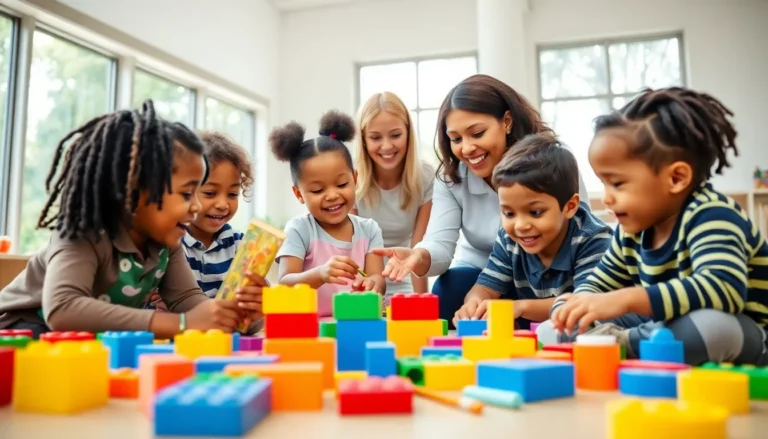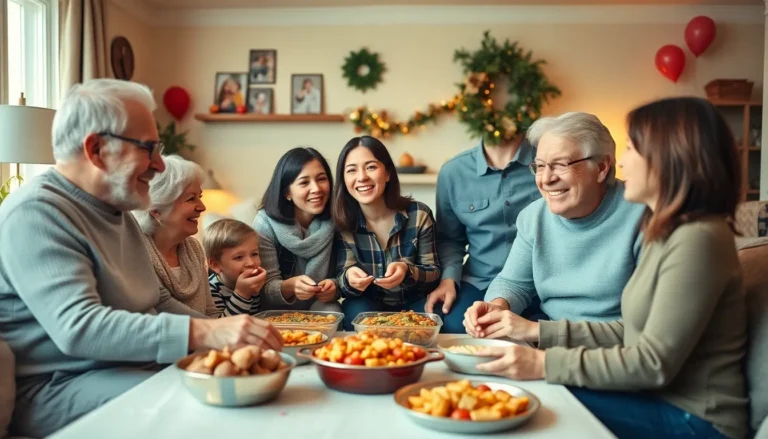Table of Contents
ToggleIf you ever wondered what keeps families in Germany glued together like a well-brewed beer and a fresh pretzel, you’re in for a treat. German family traditions embrace the essence of life, love, and laughter. Families across the country weave their unique stories, all while holding onto cultural gems passed down through generations. So, grab your schnitzel, settle in, and let’s explore how family ties in Germany are celebrated with a delightful dash of humor and heart.
The Importance of Family in German Culture

Family is at the heart of German culture, functioning as a cornerstone that shapes values and social structures. In Germany, the family unit extends beyond just parents and children: it includes grandparents, aunts, uncles, and even close family friends. They all come together to offer support and wisdom. Families often prioritize spending time together, which not only strengthens ties but also creates lasting memories.
Traditionally, Germans place significant emphasis on loyalty and responsibility within the family sphere. Respect for elders is paramount, and children garner knowledge through stories shared over meals or during family gatherings. Festivals and holidays provide perfect platforms for families to revel in their collective traditions, reinforcing the bonds that define them.
Celebrating Traditions Through Festivals
Germany is a land of festivals, each one a vibrant celebration steeped in family traditions. Take Oktoberfest, for instance. Not just a beer lover’s paradise, this renowned festival is an opportunity for families to don their finest Dirndls and Lederhosen while enjoying quality time together. The communal experience of shared meals, laughter, and clinking glasses makes festivals a highlight of the year.
Similarly, Christmas markets spring up across towns, bringing families together to warm their hearts and bellies. Stalls filled with handcrafted goodies and tasty treats create a festive atmosphere, where families stroll hand-in-hand, creating beautiful memories amidst twinkling lights and seasonal cheer.
These festivals serve as a reminder that each celebration is infused with the spirit of family, highlighting the importance of togetherness across generations.
Popular German Family Traditions
When one thinks of German family traditions, several practices come to mind. For many, Sunday dinners are sacred, often featuring hearty meals cooked slowly to enhance flavor and family bonds. On these days, families gather around the dining table for hours, chatting and sharing stories, where laughter often fills the room.
A unique tradition practiced by families involves ‘Kaffeeklatsch,’ an afternoon gathering over coffee and pastries. It provides an intimate setting for catching up with loved ones, often leading to joyful banter and occasionally, a fair share of gossip. From the holiday countdown calendar to Easter egg hunts, these customs are staples that impart values of togetherness and joy in family life.
In regions like Bavaria, the tradition of “Schützenfest” emerges, where families come together to celebrate marksmanship, further highlighting the blend of community and family activities.
Traditional German Cuisine and Its Role in Family Gatherings
Ah, German cuisine. It’s not merely food: it’s an experience, often meticulously prepared with love. Traditional dishes like Sauerbraten, Bratwurst, and the infamous Spätzle often occupy center stage at family gatherings. The cooking process itself becomes a family affair, where everyone pitches in, one person chopping, another stirring the pot, and possibly a couple sneaking bites along the way.
The act of sharing a meal transcends the act of eating. It becomes a ritual that reinforces familial bonds.
Think about it: sitting around the table surrounded by loved ones, relishing homemade food, and sharing laughter creates a warm atmosphere that strengthens connections. In Germany, knowing how to cook a “authentic” family meal often becomes a rite of passage for younger generations, ensuring that these cherished recipes live on.
Rituals and Ceremonies in German Family Life
Rituals and ceremonies play significant roles in shaping family life in Germany. From birth to death, German families celebrate life’s milestones surrounded by loved ones. Baptisms, confirmations, and weddings are grand occasions that call for festive gatherings.
Consider the custom of ‘Polterabend’, the night before a wedding, where family and friends gather to shatter porcelain. The fragments symbolize good fortune and happiness for the couple. It’s a wonderful event that combines fun and family unity.
Also, each milestone is often commemorated with family traditions. For instance, a child’s first day at school usually includes a ‘Schultüte,’ a decorated cone filled with treats and school supplies. Such rituals serve to instill familial bonds and a sense of belonging.
Modern Adaptations of German Family Traditions
While traditional family practices remain a core part of German life, modern influences have brought about adaptations. Globalization and technological advancements have introduced new traditions while reshaping old ones. Families now incorporate international cuisines into their gatherings, fusing traditional recipes with modern culinary innovations.
Also, digital platforms allow families to stay connected, no matter the distance. Video calls can now replace that face-to-face connection when gathering isn’t feasible. Distant relatives can join in the Christmas celebrations or Sunday dinners, fostering a sense of togetherness even though geographical barriers.
Reflections of modern life appear in family traditions, showcasing resilience and flexibility, adapting to new ways of celebrating harmony and love.



